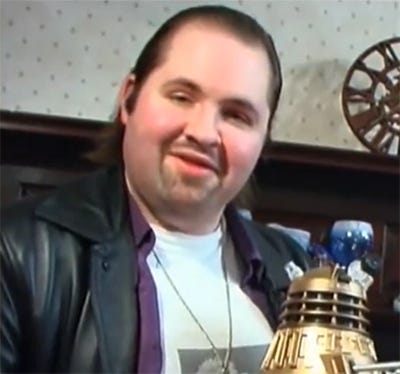Gamma vs Delta
A highly informative and educational Wall of Text
This is an intriguing historical “expose” about one higher-status writer and showrunner by a lesser writer in the British television community that moonlights as a textbook study in Gamma. The writer even appears to have perceived a glimpse of the SSH, although he attributes the differences between a Delta and a Gamma to the age between puberty and home-ownership at which every adult male happens to become stuck. What he’s really describing, of course, is the cementing of the male behavioral patterns that take place during that time.
Keep in mind, when reading this, that the Delta of whom he is complaining is a situational Alpha. But no one is ever going to confuse a King Geek for a genuine Alpha, although it’s somewhat amusing to see how a Gamma revolts against, and attempts to subvert, even a hierarchy that is almost entirely populated by Gammas and Omegas. In the land of the low-status, even a lowly Delta is King.
From a personal point of view, it's not difficult to understand why Moffat and I have never precisely seen eye-to-eye. Let's start with the Krays-style argument that men never really grow up, or at least, that they never manage to break out of the rules they set for themselves during adolescence. We'll take it as read, just for the time being, that every adult male has in some way become "stuck" during that long hormonal death-crawl from puberty to home-ownership. If true, then the difference between myself and Moffat is simple: I never quite stopped being seventeen (the age at which I first saw Press Gang, although I'm assuming there's no connection), whereas Moffat never quite stopped being nineteen. There's a whacking great gulf between the two. A seventeen-year-old, especially a bright seventeen-year-old, is fundamentally driven by angst. His mind will be open to whole new empires of experience, but he'll have no way of contextualising this in terms of the people around him. This will make him frustrated, and often socially clumsy, likely to be an idealist but with no clear idea of how to put his idealism into effect. He's inclined to be a poet, if only a bad one.
But this sort of thing doesn't trouble the nineteen-year-old, who will have worked out exactly how to deal with other people, even if it means doing everything possible to cover up any sign of emotional weakness. He'll have no time for angst, since he'll be too busy hanging around the university bar, trying to impress the girls. And, to be fair, often succeeding. If he has any neurosis, then it's the neurosis of a manchild who knows he can't ever be seen to lose any of his credibility. Idealism is fine, but only if you don't look too enthusiastic about it, and only if there's a chance to take the piss out of anyone who's less arch and impassive than yourself. (In Moffat's case, I've seen him deliberately sabotage geeky-sounding conversations that he obviously finds quite interesting, just because he can't allow himself to feel like a geek… q.v. what I said about his appearance on the Confidential accompanying "The Doctor Dances", pretending not to know what nanites are.) As a great writer once said, however: the most important thing to notice about someone who uses his sense of humour as a weapon isn't that he has a sense of humour, but that he needs a weapon.
I'll give you the short version, if you want. I like Star Wars because of its dynamism, its scope, its technique, its sheer artistry. Moffat likes Star Wars because Han Solo's dead cool and there's lots of sexy hardware...
There's a thing called the "power-pat", and it's a way for the alpha male to demonstrate his dominance over the other males in such a way that it looks perfectly friendly. It's so primal that gorillas have been known to do it, and so powerful in its social impact that world leaders are now trained in its use by body-language specialists (George W. Bush did it to Tony Blair during every public meeting they ever had, as if we hadn't already worked out which of them was taking it like a bitch). I only found out about this circa 2000, which is why I didn't initially understand why Moffat kept putting his arm around me every time he saw me. When I did work it out, I felt rather annoyed, and told everyone I met at the Tavern that he had a gay crush on me. Sure enough, he'd invariably walk up to me, touch up my shoulders for a while, then walk off again, at which point everyone would start giggling. And, on one occasion, writing "SM4LM" graffiti on one of the tables. Eventually, after reading up on bonehead non-verbal communication, I decided to try putting the boot on the other foot. The next time Moffat approached me, I turned around, reared up to my full height, advanced on him like a wall of hairy man-flesh, and - for the first and only time - took the "offensive" role in the conversation, questioning his own life and career as if such things were obviously my business. He started to shrink back, and after a couple of minutes, I realised that he was actually deferring to me. And I remember thinking: dear God, is it really this simple?
Now Steven's about to become the most significant screenwriter in the UK, and not only that, but a highly-visible public figure who's going to be held accountable for an awfully large portion of our licence-fee money. I wonder whether he's prepared for the full horror of that, and whether he'll be able to acknowledge his mistakes. Assuming he's going to make any. The trouble is, the ability to admit your own weaknesses isn't a typically nineteen-year-old trait. Especially not if the nineteen-year-old in question is trying to impress eight-million people at once.
Now observe that this was written in 2008, before I’d even coined the term Gamma. And yet, I doubt the picture of the Gamma responsible for this Wall of Text - and this is merely a few bricks in that wall - will surprise anyone.
As it happens, Steven Moffat presided over a successful revival of Doctor Who, which promptly collapsed when he ran out of gas and turned over the helm to those whose fixed idea of creativity is to make all of the characters black and gay. But since I do not care in the slightest about Doctor Who, have never seen any episode that a) aired after 1980 and b) did not star Tom Baker, and therefore am not even remotely qualified to have an opinion on the subject, I’ll quote someone who presumably is:
Moffat is credited by fans for creating some of the greatest and some of the most convoluted moments from Doctor Who. It's that old adage of the hero sticking around for too long to end up getting considered a villain, but now that Moffat has left the series, his run is being looked upon with more fondness, especially after Chris Chibnall's run after his.
Delta competence and Gamma resentment about the unfairness of the universe. Once you develop an awareness of the SSH, you can’t stop seeing how it plays out in every form of male endeavor.
This is from the second-to-last post, published three weeks before the final post in October 2015.
The most obvious point to make is that with the exception of the Dalek election issue (too good for them to resist), Doctor Who covers since 2010 have dedicated themselves to publicising Moffat-scripted episodes. I'm not going to suggest that this is because he's an awful, awful man who's lobotomised the series by turning it into his own personality cult, because if you haven't already worked that out then you're very stupid. But I will point out that - again, for all his faults - Russell T. Davies didn't play it this way, at least not in the beginning. On Davies' watch, we have covers that suggest the story rather than the people who make it, breaking the modern Radio Times norm and returning us to a more dynamic era. This starts to fall apart at the same time as the series itself, circa 2008, when the Celebrity Age of Doctor Who really kicks in and David Tennant's presence becomes more important than any of his adventures; the point when the coups of hiring John Simm or Catherine Tate or Kylie Minogue become bigger news than the content…
I'm putting my cards on the table now. I haven't watched Doctor Who since 2011, because it was just horrible and I don't like staring at things that make me feel bad.
So seven years after the diatribe greeting his bete noire’s elevation, and four years after he stopped watching the television show, he’s still carping about both of them. Keep this in mind the next time you find yourself wondering whether the Gamma in your life is going to get over the latest affront to his equanimity.




“But no one is ever going to confuse a King Geek for a genuine Alpha, although it’s somewhat amusing to see how a Gamma revolts against, and attempts to subvert, even a hierarchy that is almost entirely populated by Gammas and Omegas. In the land of the low-status, even a lowly Delta is King.” This is how I keep getting promoted despite being an Omega. HR for the Government is 70% women, 20% Gamma, 10% Delta, and less than a single percentage anyone else.
I met one alpha and one bravo during my entire career. The Bravo got promoted to an Executive in record time but the Alpha got promoted to Manager quickly, but can’t figure out how to lead a team that is solely Women and Gammas. He gives clear instructions and can’t fathom why everyone keeps asking him why they should do why they should do it that way. They keep undermining him and he’s already had two EEO complaints filed against him.
That picture is Doof in the flesh. Well done Lacy.